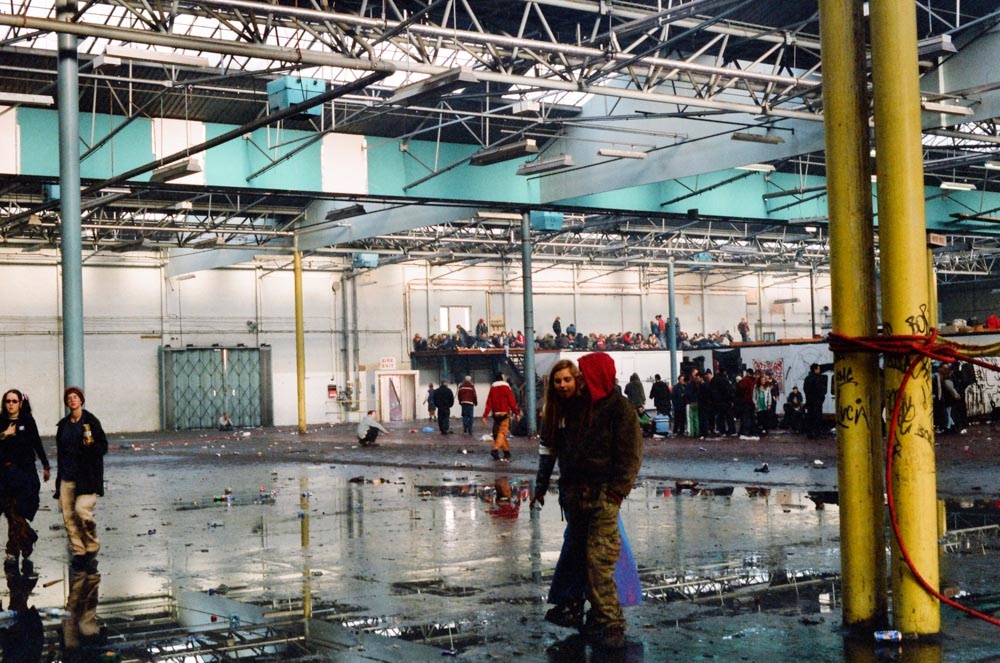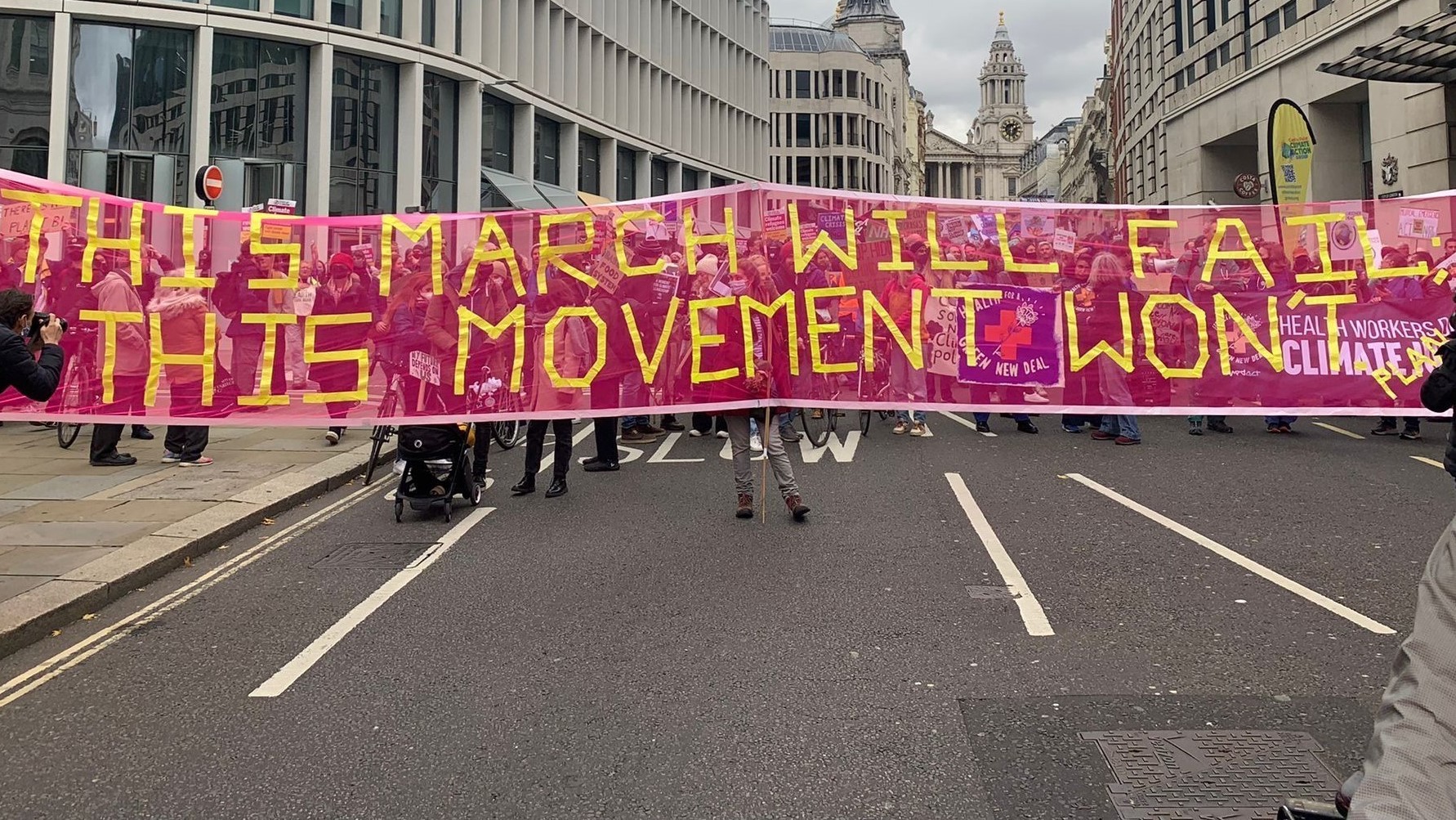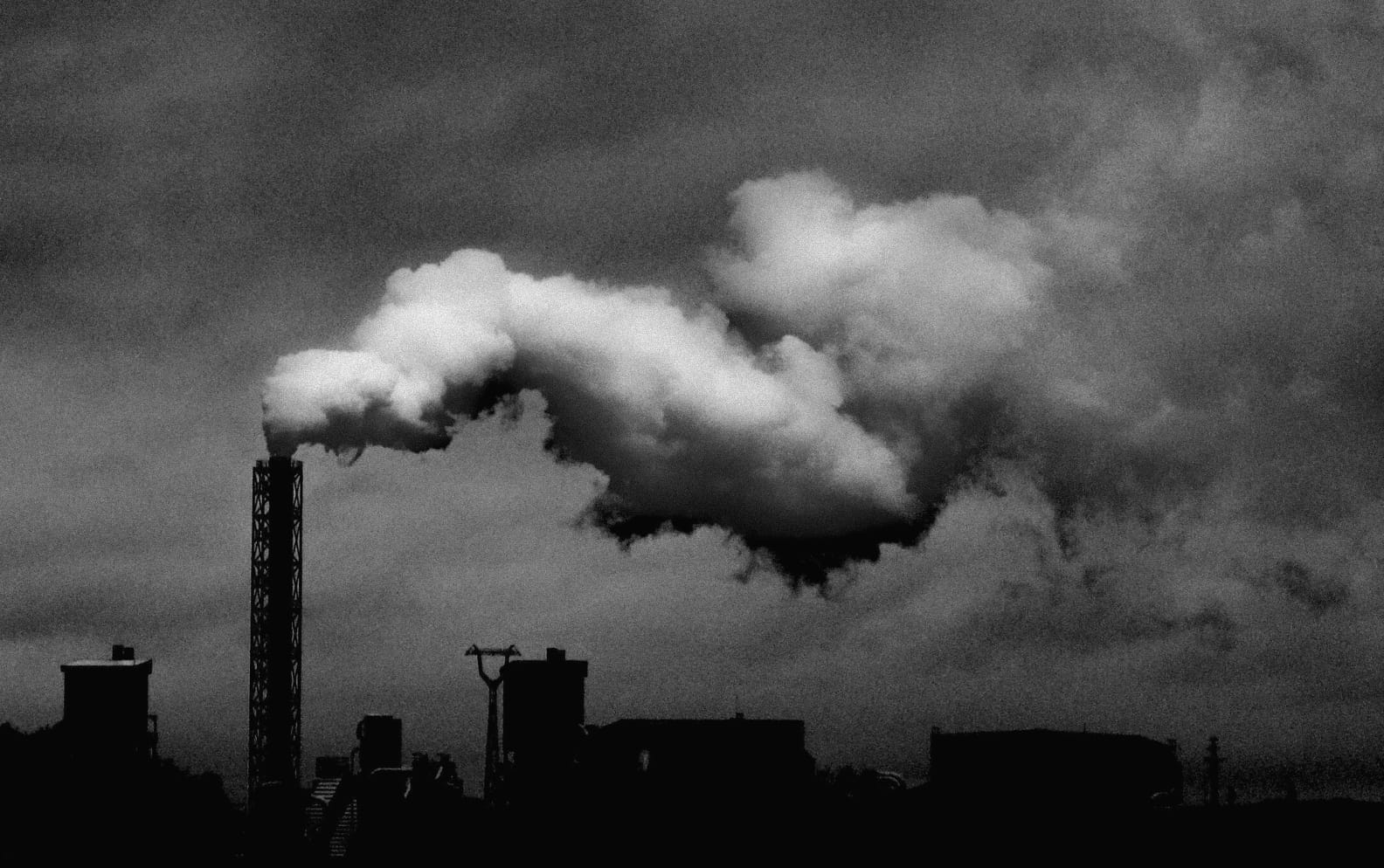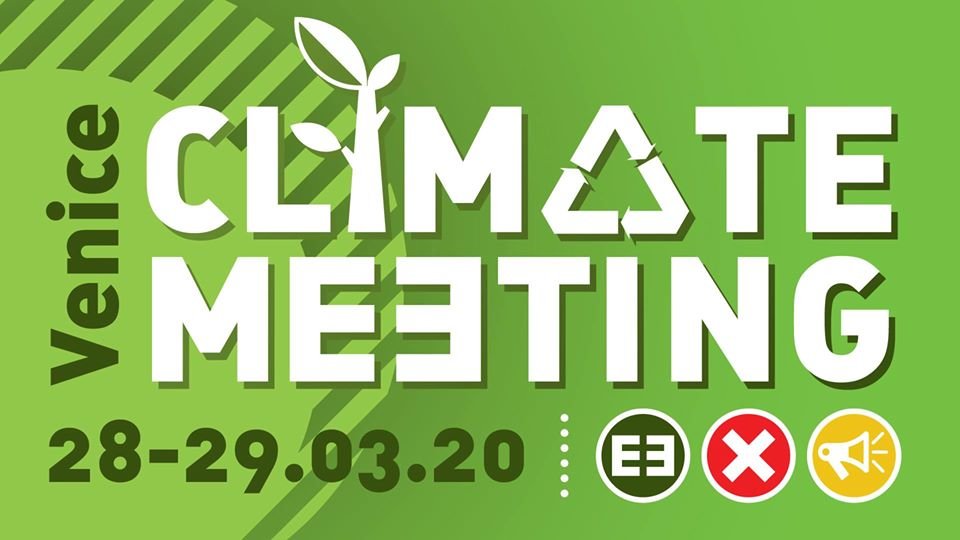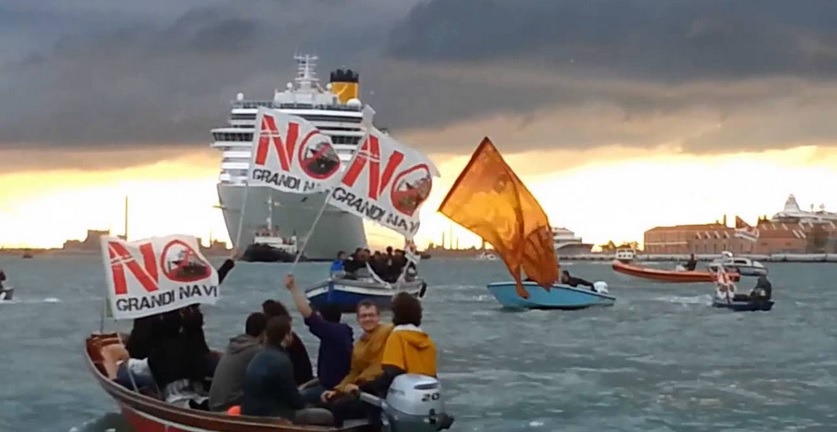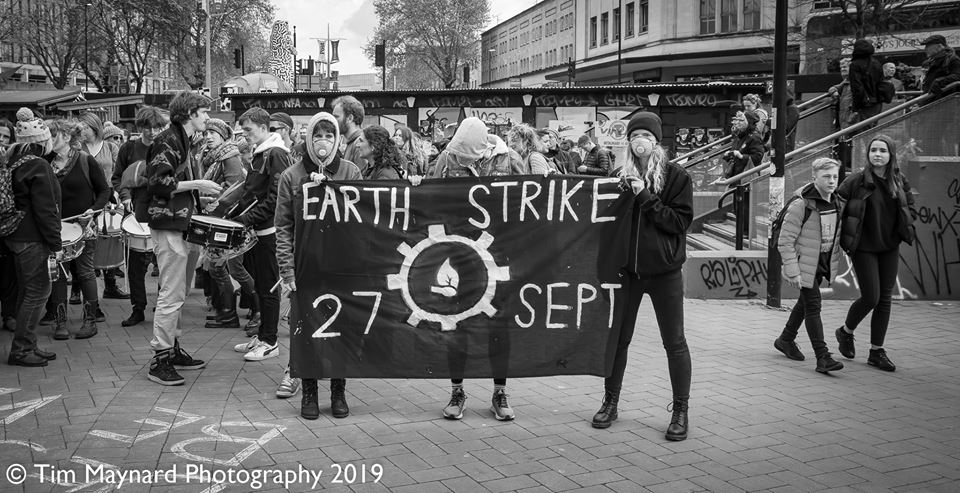Tadzio Müller works for the Rosa Luxemburg Foundation as head of its Climate Justice- and Energy Democracy Desk. He has been involved for many years in the climate justice movement
Interview: Carl Melchers
Originally published in Jungle World
2016 having been rather eventful, what do you think the new year will bring?
For me as a climate justice activist – and as gay man, a leftist and an anti-fascist – the election of Donald Trump, an out-and-proud climate change denier, was deeply disturbing. When the news came in, I was at the climate change conference in Marrakech, and my first instinct was to drink myself into a stupor. Unfortunately, the UN-cops took away my Whisky-flask. Also, the electoral successes of the AfD [Alternative for Germany – Germany’s newly popular right-wing populist party] are pretty depressing. Nonetheless, I’m going into the new year with a kind of defiant optimism, an optimism that is in large part a result of my HIV-outing and the many unexpected and unbelievably positive responses to it that I received.
On December 1, World AIDS-Day, you outed yourself as HIV-positive in a fairly long text on Facebook. What kind of responses did you get?
It was actually one of the most moving moments I ever experienced. I made the post public, so that every Facebook user could see it. And then some people that I didn’t even know wrote from wherever they were: “Thank you for writing this, you have given me a lot of strength.” People from Mauritius and Canada, from Brazil and Finland – they all wrote to tell me how strong and brave they thought my post had been.
So how did you get to that point?
Ok, to explain that, I need tell the long version of the story. Insofar as people here know of me at all, my role is that of an eco-climate-guy, a classic left cadre. Someone who is always centrally involved in political organising. Well, in those processes, you have to function. And I suppose I can say that I sort of did, especially as a successful co-organiser of campaigns of mass civil disobedience: e.g. in 2015, I was involved in the anti-coal protests organised by the ‘Ende Gelände’-campaign. The evening before the action, most of us thought that we wouldn’t make it. But when we got into the pit, and realised that we’d managed to evade all the police lines, that we’d shut down those humungous diggers, the prevailing feeling was: wow, we did it!
That is how I met you some years ago, as a rather unorthodox and innovative media strategist in the anti-nuclear campaign ‘Castor Schottern’ in Germany’s Wendland. So what was the problem?
That in becoming this full-time political cadre I completely marginalised and disavowed an important part of myself. Apparently, I thought that this was the only way to function as an activist. I ended up neglecting myself – or parts of myself, at least – in ways that kept producing absurd pathologies. I compartmentalised the kinky-queer-sex-slut part of myself so much, and felt so marginalised in a radical left within which, to exaggerate only a little bit, bodies simply don’t exist.
Can you explain that a bit more?
We in the German left tend to distrust bodies, seeing as that the Nazis managed to appeal to and mobilise bodies. Many leftists in this country have a conceptual framework that is, consciously or unconsciously, influenced by the Frankfurt School. One of their points ends up being that emancipation has to come from the head, from rationality. That means that bodies and affects as political fields – on which there is something of a taboo on the German left, they are in fact sometimes seen as anti-emancipatory – are left open to ‘the other side’.
But isn’t there a significant part of the left that only seems to be talking about emotions, identities and the creation of ‘safe spaces’?
For sure there are some tendencies where things went a bit awry – especially the discussion about so-called safe spaces and politically acceptable terminologies can unwittingly become rather exclusionary, and can appear as rather sectarian. The left shouldn’t scare people off. The left has to be hot! I also feel that we as leftists need to include questions of bodies and affects much more centrally in our political practices. For example, I don’t only fight against climate change because I see it as the biggest justice-crisis we’ve ever faced, but also because I want to be part of developing a kind of politics where fighting for a good cause is fun and sexy. Of course it remains important to ground our politics in reason – after all, the whole climate-change debate doesn’t work without making traditional truth-claims.
What do you mean when you speak about ‘affects’?
There’s a bit of an excess of rationalism on the German left. The concept of shame is, for me, a central one in this debate – a point well made by Didier Eribon in this Return to Reims. Shame is another one of those terms that the German left doesn’t really deal with.
What role does shame play in your own life?
Unfortunately, a rather large one, because there’s almost always something that makes me feel ashamed. I feel ashamed because I fucked around with guys behind my girlfriend’s back for seven and a half years. I feel ashamed because sometimes, at the beginning of the week, I have marks on my back from getting whipped – in which case I avoid playing sports. Or I’m ashamed because I have a comedown during a work meeting on Monday, because I was high and awake for two days over the weekend. And until a few years ago, I felt ashamed because I’m HIV-positive. The realisation of the way in which shame structures my own actions – and then feeling the energy that is released when you let go of this shame is absolutely unbelievable.
So how did you get into a politics of civil disobedience?
My fundamental political experience was the anti-WTO-protests in Seattle, in 1999. I can remember the precise moment, when after hours of blockades and rioting it was announced that the summit was suspended for the day. There were no cops in sight anywhere, it was only our people, everywhere, right next to me a hippie-couple was snogging, others were dancing. After nine years of the end of history we had managed to say: ‘no, history is not over yet!’ I recall very clearly the physical feeling of empowerment. This connection of bodies in the streets, mass civil disobedience and a massive feeling of political empowerment – that is what has shaped my politics ever since.
And you experienced something similarly empowering after your coming out?
Exactly. In fact, in terms of the positive charge that these events held for me, I can only compare my HIV-outing with the ‘Battle of Seattle’. And I am consciously not using the English word ‘empowerment’ [but rather the German word ‘Ermächtigung’], because I don’t believe that they have such different meanings, as is frequently asserted [translator’s note: the German word ‘Ermächtigung’, which literally translates as ‘empowerment’, is tarnished by the fact that the law by which the Nazi-government enabled itself to pass laws without the involvement of parliament in 1933 after the burning of the Reichstag was called the ‘Ermächtigungsgesetz’, i.e. Empowerment Law]. Certain terms and concepts that are used quite unselfconsciously in Anglo-American contexts are tarnished in Germany – understandably, to be sure – because the Nazis have so to speak ‘occupied’ them. This is why the German left is, again, understandably, rather cautious about using certain terms and concepts, e.g. ‘leadership’ [which would translate as ‘Führung’, reminding us, of course, of Der Führer].
Perhaps the concept is in fact by no means more emancipatory in English than it is in German?
Well, you need to look at specific contents here. Of course I don’t want it to refer to an organisation based on a strong leader, on hierarchy, orders and obedience. I agree that it is right to be cautious in using those terms, but that doesn’t mean that another usage isn’t possible. Here in Germany, leftists have a tendency to be extremely rationalist. For understandable historical reasons, the German left distrusts political speeches and performances that seek to mobilise affects – and for the same reasons it also distrusts charisma. But if you take a look, for example, at the struggle against the North Dakota Access Pipeline, Native American communities have quite a clear understanding of the need for leadership, including in social movements.
Would you call yourself a charismatic leader?
I don’t think of myself as the leader of a social movement, but rather as a storyteller – which, to be sure, is also a form of leadership. The story I have been telling started out as that of mass civil disobedience, after Seattle.
Heiligendamm [Block G8 in 2007], ‘Castor Schottern’ and ‘Ende Gelände’ – have you been trying to reproduce your Seattle-experience, and to enable people to have that collective feeling of empowerment that you experience back then?
Yes, I suppose that that is the essence of what I’ve been doing. These actions were designed so that, if successful, people can experience a strong feeling of empowerment.
But next to the feel-good-effect, these collective acts have concrete political goals. Aside from creating a feeling of empowerment, what is the connection between collective civil disobedience and the individual act of outing yourself?
Of course I’m not only pursuing a kind of feel-good politics, I remain after all strategically minded socialist cadre. But I do think that this aspect tends to get ignored a bit too much. Which leads me to introduce the distinction between macro- and micro-politics, which may initially sound a bit banal,. What I have been doing for the last few years is to push a macro-political project, namely to be part of creating a major climate justice movement, because I believe climate change to be the biggest justice crisis humanity as ever faced. What I didn’t do during those years, however, is to pay attention to the micro-political dimension, that is to say, to the question of how I myself fare as a subject in those processes, what I was doing to myself as someone who has, let’s say, somewhat wild sexuality. When I finally realised [after Ende Gelände 2.0 in 2016] that this movement now finally existed, I also realised that I had neglected myself in many ways.
Was there any particular experience that made you draw that conclusion?
Actually, yes. I was in Montreal at the World Social Forum in August 2016. I skipped the closing session, and went to the Montreal Pride March, where I figured there’d be large numbers of sexy men around. I met this gorgeous radical queer activist [translator’s note: they edited out the reference to his looks, but holy shit, he was more than gorgeous! And so wise for his young years. Thank you! You know who you are J], and we started snogging wildly. After about an hour or so he looked at me and asked: ‘Hey, do you think you maybe suffer from internalised homophobia?’
And I guess that, as a good lefty academic, you took that question as a good reason to stop snogging and start thinking and analysing?
That’s in fact exactly what I did. I sat down on the curb, on my own, for 15 minutes, chain-smoking cigarettes, and suddenly realised: he’s absolutely right. Though I have spoken very openly about my sex-life for a long time, I started to realise then that I had actually not been able to really accept myself. In part that is because of the classically German bourgeois upbringing I received. There simply was no sexuality. As a result, I developed much of my sexuality behind my partners’ backs, and crucially, lied to myself about it. It’s also connected to the fact that I have been HIV-positive for five years, something that often entails significant amounts of shame.
So you had reached a point where you could no longer continue?
Well, there were two moments, actually. One was the young man [in Montreal], who made me realise that, yes, I suffer from internalised homophobia. I realised that I was unable to accept who and how I actually am. I reproduce an enormous amount of prejudices about gay men within myself. The second significant moment came [at the end of November], when I was totally high at a guy’s place, and he said to me: ‘look, you keep complaining that your life is socially and culturally way too heterosexual. Well, why don’t you stop looking like one of them?’ And he then proceeded to convince me to shave my head.
What was so special about that haircut?
It wasn’t really a haircut, it was more a performative act. Because while he was shaving off my hair, I broke down in tears pretty much right away. I started talking about the prison I had built around myself. As the hair was falling off my head, I realised that some kind of dam had been breached, and that I was finally becoming able to accept all the different parts of me – the gay and the polyamourous, the kinkyness and also the fact that I’m HIV-positive – and that I should start communicating this to the outside world. This was the moment when I started being able to accept myself [and another translator’s note: things didn’t work out the way myself and the lovely man who shaved off my hair then had planned – but I will be eternally grateful to you for that moment. Literally, eternally grateful. Thank you. Again, you know who you are]
Was there a private outing prior to the public one?
I’ve been HIV-positive for more than five years, and have of course spoken about it with my friends. And I have to say, it’s shocking how little people know about it, about the medical facts: that there is medication, which I am taking, that mean that I am de facto not an infection risk, that I can live a completely normal life.
Did you have a political goal in mind with the outing, beyond your own empowerment?
The first openly gay US-American politician, Harvey Milk, once said: ‘Every gay person must come out!’ He was talking about gay men, but for me it was about people who are HIV-positive. As long as you have access to a decent health-care system, the problem with HIV is not a medical one. The problem is the stigma. I realised that I am in an extremely privileged situation: I move in a part of the left where nobody will attack me for this, I have a stable circle of friends, and my family know about this as well by now. Others in my situation (i.e. being positive) might not have this level of cultural and social resources [to support a coming-out]. For me, that was a step towards my own emancipation.
And how do you connect that with your macro-politics?
I work at the Rosa Luxemburg Foundation, where, for example, folks sometimes ask the question of how prominently we want to feature calls for a rapid phase-out of coal in Germany, a call that emerges from a global justice perspective. However, that might mean that the coal-mining districts [particularly the one South-East of Berlin, where the Left Party is quite strong] would defect en masse to the AfD. I do not have a conclusive answer to that question for myself, but I know that I refuse to put all the pink, purple and green questions – i.e. climate justice, LGBT, feminism… – on the back burner, just because the traditional left didn’t manage to keep its own societal base connected to the overall left project. There is now a backlash against women, homos and enviros on the left. We are being told: ‘you delivered the working class to the AfD’. That is, of course, total bullshit. That was certainly not our fault.
Where do you see the left right now, and what has to happen?
We live in a country that likes to pretend it is ‘world champion’ in renewable energies, while it is in fact world leader in mining and burning lignite (soft brown coal). We burn more of this dirtiest of all fossil fuels than any other country in the world, including China and India. We cannot wait another 15 years, until the AfD is defeated, and only then start talking about a coal-phase out again. That’s simply not on. We know that feminists and fags no longer talking about ‘their’ issues won’t make left-wing politics any more attractive. Wolfgang Gehrcke and Dieter Dehm [two dinosaurs of the German left – translator’s note] recently argued thusly in Neues Deutschland [a newspaper extremely close to the Left Party]: screw this basket-weaving and vegan-cooking-bullshit, we need to get back to a classic welfare state politics. But honestly, who gets turned on by that sort of left politics? For me that is the open question and the project as I enter the new year: how do we create attractive leftist narratives, that include the fags and the feminists and the eco-types, and that convince people because they’re sexy?
Do your positive experiences from the ’Ende Gelände’-blockades on the one hand, and your outing on the other, constitute resources that you can draw on?
Well, that’s sort of the trick I’d like to perform this year. As a diseased, semi-foreign eco-fag – my mother is Brazilian, my dad’s German – I like to think that I’d be an ideal projection board for hatred from the AfD and other right-wing populists. I would like to create some kind of narrative around this. This being my project for the coming year, I believe that we can find common left-wing grounds across class-boundaries.
You are successful, charismatic, eloquent and offer a counterpoint to everything that the reactionary forces from the AfD all the way to Trump are striving for. Are left-wing parties not cueing up, asking you to join?
No, not really. And I do have to say that I am ultimately a hardcore social-movement-romantic. I really do believe that all that is good, true and beautiful in the world was once upon a time demanded by social movements. This is where solutions come from. The second reason why I’d be sceptical about such plans is that I like to live a life in which I can stumble out of [Berlin’s iconic, hedonistic] Kitkat-Club, with pupils the size of dinner plates and with two naked men in my arms, without some tabloid journalist snapping a photo of me. That’s also freedom and emancipation for me. I’d like not to become the next Volker Beck [a gay politician who was nabbed by the cops with some class-A-drugs, and subsequently hounded out of office by his own party – the Greens].



